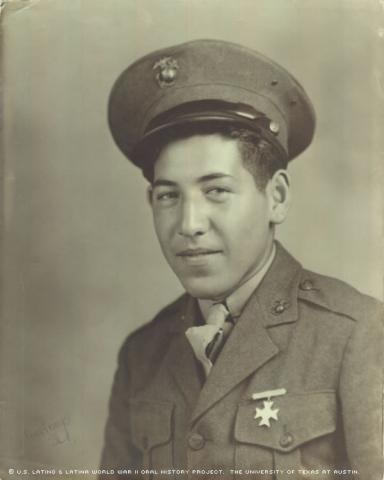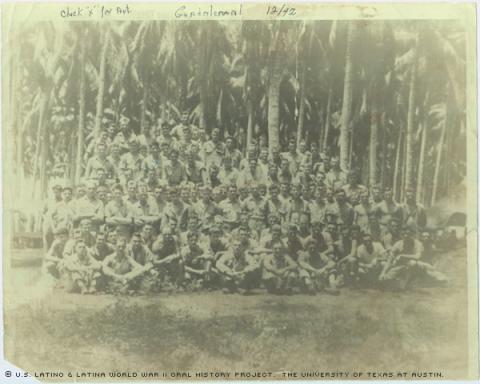

By Brenda Menchaca
“There are no barriers unless you make them yourself,” said Arthur Muñoz, who enlisted in the Marine Corps two weeks after Pearl Harbor.
While working as a Western Union messenger in Corpus Christi, Texas, he’d been delivering telegrams to the federal building where Armed Forces recruiting offices were located.
“[I] always thought Marines looked sharper in their blues,” so when the time came to choose a military branch, Muñoz recalled saying, “that’s for me, that’s where I’m going.”
Only a sophomore in high school when he signed up at the age of 17, World War II changed his life’s course of events, as he’d originally planned on working for the Civilian Conservation Corps and was set to go to Arizona to build fire lanes in National Parks. Instead, he went to boot camp in San Diego, Calif., from January to March. During his final month of Basic, Muñoz recalls training in the Imperial Valley’s desert, and he and the rest of the 1st Marine Division thinking they’d end up in Africa because of the desert workouts.
They were all sent to the Pacific for three years, however, where Muñoz worked as a wireman.
“My job was to land with the initial assault wave, carrying a telephone and a reel of wire beside my regular battle gear. I was with a team that consisted of three men: myself, a radio man and his assistant carrying extra batteries for the radio; we’re talking large radio, big batteries,” wrote Muñoz after his interview. “As a wireman[,] we called ourself ‘sniper bait’ because it was necessary to string the wire high off the ground so the incoming trucks and tanks would not shred the telephone wire. And what was there to climb? Coconut trees, tall coconut trees making us very visible to Japanese snipers.”
Among other specifics about his experience, he recalls getting a bad case of malaria during a four-month stint on Guadalcanal:
“I spent a lot of time in an Australian hospital run by the Sisters of Charity,” Muñoz wrote. … “With malaria you are freezing and having a high degree of fever, both at the same time. I came to one day in a bathtub filled with ice and two Sisters by the tub. They had stripped me naked, placed me in the tub and now were watching me, later telling me[,] ‘you died, your fever was very high.’ I have no recollection of being taken from the ward bed, stripped, and placed in the tub.”
About the other men in his company, Muñoz remembers they “were all kids,” the oldest being 19 and called Pop by the other Marines. His fellow Marines
were mostly from Brooklyn, N.Y., he says, and he got along well with everyone. He even joined the Corps tennis team, picking up the sport at some point after he enlisted.
After also spending time on Pavuvu, the Russell Islands, Cape Gloucester and Peleliu, as well as working on inventory at the San Francisco Marine Supply Depot, Muñoz recalls being discharged in early 1946 at the rank of Sergeant. For his service, he earned five battle stars and two presidential citations.
********
Upon his return to the States, Muñoz says he joined the reserves for some extra cash. And through the G.I. Bill, he wanted to begin his college career. That was before formal GED programs existed, but he says a high school in Corpus Christi allowed veterans to finish their education so they could attend college.
Muñoz was employed during the day at a naval air station, working on wheels for Navy seaplanes; at night, he attended classes, finishing high school in six months.
Next, he enrolled at A&M Kingsville, where he got involved with the American GI Forum and helped Chicano civil rights movement attorney Gus Garcia register people to sign the poll tax so more Latinos could vote. Muñoz recalls many of them having no idea they could vote prior to their encounter with him.
During his senior year of college, Muñoz was called back into the Marine Corps, but he didn’t get sent off to Korea.
“[I]nstead, I stayed at Camp Pend[le]ton in Oceanside, California[,] giving infantry training to units going to [K]orea. (Very lucky),” Muñoz wrote.
“Nobody thought there would be another war,” said Muñoz, who was stationed at Pendleton for two years and never went back to finish his degree.
********
Muñoz was born and raised for some years in Los Angeles in a predominantly Russian/Jewish neighborhood by his mother, Manuela Garcia Gamboa. His father, Adalberto Muñoz, passed away when he was 3.
Being the only Latino in his neighborhood was never an issue, he says. All of his friends were Jewish and he knew “all the Yiddish curse words in the book,” he said with a laugh.
Muñoz recalls his mother instilling a passion for books in him, showing him authors like Dante and Milton before he was even 10 years old. She only had a third-grade education, but loved music and reading, Muñoz says.
During high school, he was employed by the National Youth Administration, working for free at a library in Corpus Christi.
“[I] made it a point while working there to read every book,” said Muñoz, adding that he got to the third of 10 shelves before leaving for Marine Corps boot camp.
Economic struggle isn’t something he claims to remember from his childhood, but he does say he held a series of odd jobs, beginning at about eight or nine with delivering prescriptions for a drug store. The store would pay him by letting him read magazines for free and giving his ice-cream cones, says Muñoz, chuckling at the memory.
When carnivals and circuses would come to town, he’d work to gain free entry. Later on, he also worked for a neighbor who had a Borden’s milk route, leaving the house at 2:30 a.m. to deliver milk on people’s doorsteps.
At the age of 11, Muñoz’s mother relocated the family to Corpus Christi. This was a complete culture shock to Muñoz, who wrote he was completely unaccustomed to “living with indoor plumbing.” On top of that, he said during his interview that he’d never met other Latinos – or a black person, for that matter – prior to that.
The local vernacular was also a shock, as many people spoke Spanish. Muñoz’ mother, however, grew up struggling to learn English and didn’t want her children in the same predicament, so Muñoz never picked up Spanish. He says he regrets never learning or teaching his children.
Times have changed and Latinos are now proud of both their American and Hispanic heritage, says Muñoz, who attended the initial GI Forum meeting, during which he says Gus Garcia pushed Latino veterans not to hyphenate their identities and to speak English.
“We fought as Americans, not Mexican-Americans,” Muñoz explained in writing. “This was 1946-49 thinking.”
********
After returning from Oceanside, Muñoz was employed as a police officer for the San Antonio Police Department for 22 years. Then he went to New Mexico to manage security contracts for San Antonio-based Stanley Smith Security Company.
Muñoz is now a published writer, his work having appeared in newspaper The San Antonio Express-News and anthology “Hit List: The Best of Latino Mystery.”
His final words of advice to young people are to “dream high,” to do what you dream but to “work for it. Nobody’s gonna give it to you.”
He said the Marine Corps allowed him to believe he could “take anything,” and live his life with that mindset.
“Shooting and getting shot at becomes a routine situation,” wrote Muñoz of his WWII years.
Mr. Muñoz was interviewed in San Antonio, Texas, on May 3, 2008, by Kris Edward Rodriguez.

